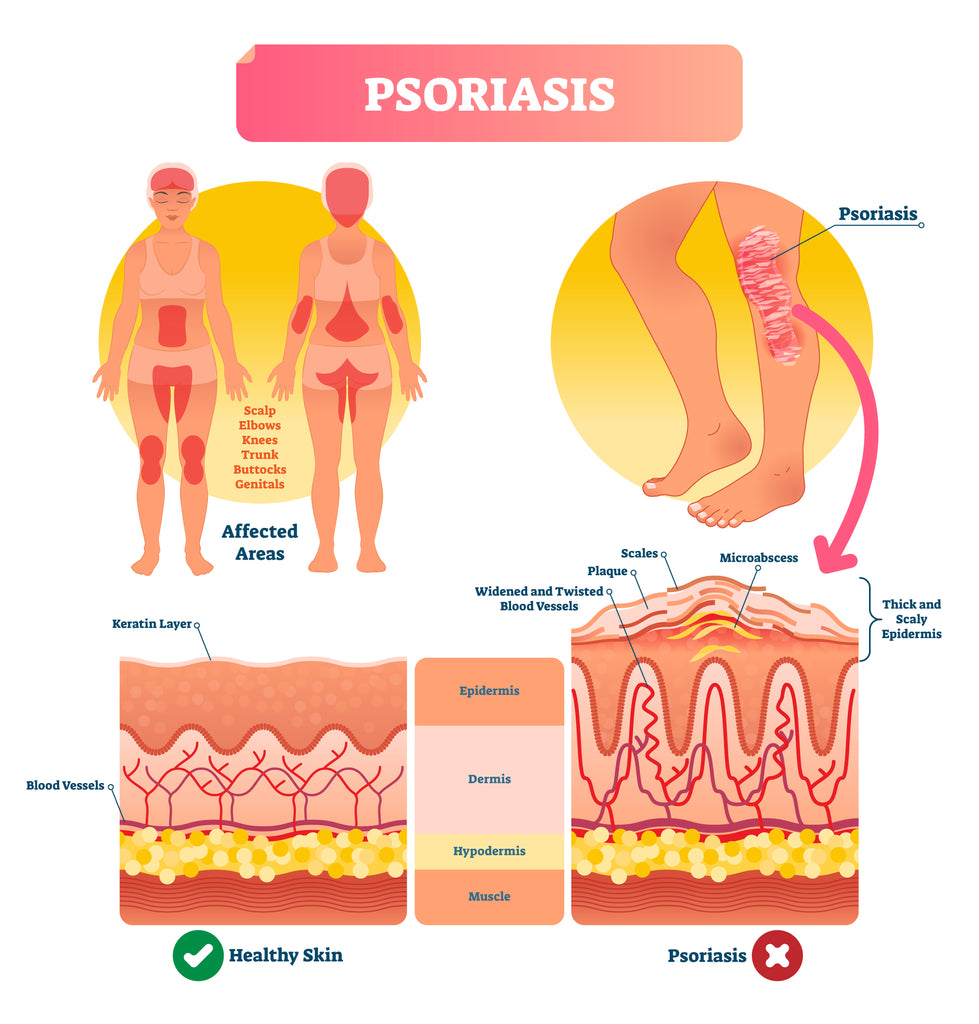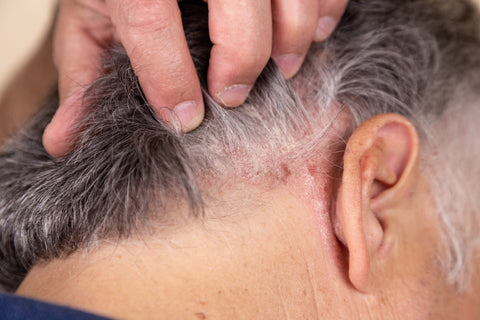
Psoriasis is a non-contagious, chronic skin condition that causes plaques of thickened or hardened red, scaly and flaky skin.
Unfortunately the cause of psoriasis is still unknown, and the subject of an entire field of medical research. It is, however, thought sufferers are genetically predisposed to the condition.
There are many triggers of psoriasis – these include the following:
- Stress
- Alcohol
- Skin Trauma
- Medicines
- Obesity
- Infections
- Endocrine Disorders
Psoriasis outbreaks can affect any part of the body but are most commonly found on the knees, elbows, scalp and lower back. These areas of dry, crusty skin can often be itchy and very uncomfortable.
Diagnosis
Scalp psoriasis specifically can often be misdiagnosed by hairdressers and even GP’s, given the sometimes similar appearance to other conditions such as dandruff, seborrheic dermatitis, eczema and pityriasis amiantacea.
A GP can send off a skin sample (a biopsy) for examination in order to determine the type of psoriasis or skin condition. If a GP is unsure of your condition, you may be referred to a specialist dermatologist.
Epidermal Turnover
Although sometimes similar in appearance to other skin conditions, psoriasis is actually quite different in many ways…
The main characteristic of psoriasis is that the formation of cells at the base layer of the epidermis (the outer most part of the skin) is extremely rapid. Normally it takes 30 days to form, pass through the epidermis, reach the surface and leave it when we wash or remove clothing etc. This is called the epidermal turnover.
With dandruff, this process speeds up and may take between 14 to 18 days, rather than 30. With psoriasis, this process can be very fast, taking only 3 to 5 days in more extreme cases. This means the cells that pass through the skin simply do not have time to carry out their normal processes, resulting in the skin becoming red, inflamed and tender whilst a silver scale builds, eventually flaking off.
What are the objectives of Psoriasis Treatment?
- remove scale from the surface of the skin
- slow down the epidermal turnover
- create a calming and soothing effect on the skin

A Natural Remedy for Scalp Psoriasis – Slowing the Epidermal Turnover
The Juniper Scalp Therapy Shampoo & Conditioner have been clinically developed by a leading UK Trichologist and award winning cosmetic scientist, with a rich blend of natural therapeutic essential oils that have a dramatic effect on the scalp and hair. A highly efficient anti-microbial treatment, our products offer your scalp the desired relief from inflammation, irritation, and itching, whilst helping to clear scale from the scalp.
Most importantly, however, the Juniper Scalp Therapy Shampoo contains juniper tar (cade oil), extracted from Spanish juniper trees by steam distillation. The high percentage of juniper oil has a marked anti-mitotic effect – slowing down the epidermal turnover, allowing the scalps metabolism to return to a normal, healthy state so no further scale forms.
We recommend daily usage, or every other day, until the condition of the scalp improves. For scalp psoriasis, this could take several weeks, which is considerably longer than other conditions, depending on the severity. As soon as the health of the skin improves, usage of the Juniper Scalp Therapy Shampoo can be reduced down to one or two washes per week.
Tips for removing a build-up of scale on the scalp
- Build ups of scale on the scalp can be removed by running a relatively close-toothed comb over the scalp in the opposite direction to the way the hair grows
- For example, at the front of the scalp, over your forehead, hair grows out of the follicles towards the front of your head, so place the comb on your scalp facing backwards and gently go over your scalp to gently loosen and lift any scale
- Any combing of this nature should be done very gently, as any scalp stimulation may exacerbate the problem
Professional Help
For serious psoriasis outbreaks, or if you are worried about your condition, don’t hesitate in consulting your GP, Dermatologist or a Trichologist in the case of scalp psoriasis.
For more severe cases of scalp psoriasis, we recommend getting in touch with The Institute of Trichologists

